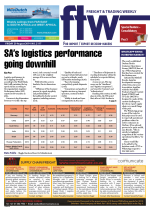The latest restrictions in
the air cargo transport
of lithium batteries
have raised a number of
compliance problems for
electronic
goods
manufacturers.
So much
so that one
of these, SA’s
Trolley Scan,
has had to
completely
redesign
and rebuild
its range of
transponders.
According
to MD Mike
Marsh, the original
International Air
Transport Association
(Iata)/International Civil
Aviation Organisation
(Icao) lithium battery
restrictions excluded
very small batteries. But
from April 1 this year,
the rulings added these
“button batteries”.
“Since then it has
become extremely
difficult to
airfreight
any
electronic
item that
contains
any form
of battery,”
he told
FTW. “And
remember
that
these are
long-life
but very
small watch batteries
that are built inside
the transponders in
manufacture to power up
the devices for five years.”
But now, Marsh added,
any battery that uses
lithium is marked for
special attention and
regarded as a hazardous
cargo, and is not allowed
in some countries (like
the US) to be shipped on
an aircraft that carries
passengers.
“And, with the goods
being classified as
hazardous cargo, the
shipping costs are much
higher than normal.”
So Trolley Scan has
redesigned the batteryassisted
transponders
in its product range
to allow access to the
batteries from outside the
transponder.
Said Marsh: “This is
not an ideal solution as
the waterproofing of the
transponder has been
compromised but it does
allow the equipment to be
delivered.”
INSERT & CAPTION
Trolley Scan has
redesigned the
battery-assisted
transponders in its
product range.
– Mike Marsh

